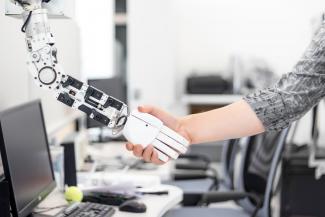
Do the preparation task first. Then read the text and do the exercises.
Preparation
If you think of the jobs robots could never do, you would probably put doctors and teachers at the top of the list. It's easy to imagine robot cleaners and factory workers, but some jobs need human connection and creativity. But are we underestimating what robots can do? In some cases, they already perform better than doctors at diagnosing illness. Also, some patients might feel more comfortable sharing personal information with a machine than a person. Could there be a place for robots in education after all?
British education expert Anthony Seldon thinks so. And he even has a date for the robot takeover of the classroom: 2027. He predicts robots will do the main job of transferring information and teachers will be like assistants. Intelligent robots will read students' faces, movements and maybe even brain signals. Then they will adapt the information to each student. It's not a popular opinion and it's unlikely robots will ever have empathy and the ability to really connect with humans like another human can.
One thing is certain, though. A robot teacher is better than no teacher at all. In some parts of the world, there aren't enough teachers and 9–16 per cent of children under the age of 14 don't go to school. That problem could be partly solved by robots because they can teach anywhere and won't get stressed, or tired, or move somewhere for an easier, higher-paid job.
Those negative aspects of teaching are something everyone agrees on. Teachers all over the world are leaving because it is a difficult job and they feel overworked. Perhaps the question is not 'Will robots replace teachers?' but 'How can robots help teachers?' Office workers can use software to do things like organise and answer emails, arrange meetings and update calendars. Teachers waste a lot of time doing non-teaching work, including more than 11 hours a week marking homework. If robots could cut the time teachers spend marking homework and writing reports, teachers would have more time and energy for the parts of the job humans do best.




For some routing work as a grammar repetition or pronunciation correction, yes, it could work. Also, I wouldn't be mind at all if a robot sent me interesting tests or articles to learn. At the same time, I feel more trust to the human teacher, but can't explain why.
It depends! A robot teacher could be great for subjects like math, coding, or language learning, where AI can provide instant feedback and personalized lessons. It would be available 24/7, never get tired, and could adapt lessons to my learning pace.
However, human teachers bring empathy, motivation, and creativity—things a robot might lack. Learning is not just about knowledge but also discussion, real-world experiences, and emotional support, which only a human teacher can provide.
So, I’d prefer a combination—a robot for practice and a human for guidance and inspiration!
Actually I don't think so,I prefer a human teacher to mentir and teach me,it is not only about getting information but also I need a human teacher to empathize with me , appreciate my work and to support me,I reckon robots cannot do that.
I don't know if I really like it, but I wouldn't have a problem with it. Already now, I get most of the information and knowledge using Internet or AI.
Would you like to have a robot as a teacher?
Having a robot as a teacher's assistant is good because students learn from the teacher according to their emotions. Sometimes students are tired and want to learn some general topic instead of the course topic so the teacher changes the topic according to students' emotions. Since robot has no emotion, this will be impossible for robots to be successful in the teaching field.
I don't think what robots replace teacher because a teacher always will better than metall.Maybe, in future robots or AI can help teacher mark homework and lesson.To day AI make big progress for example Chatgpt.
Robots are, already, our teachers if you haven't noticed) I'm talking about educational online lessons and courses. They are not robots in our general representation of metal humanlike gears with strange voice, but algorithms that give us the information and tasks and marking our homeworks. Some of them can answer our questions using GPT systems. So, the future is, already, here!)
In the future, I believe that robots will become wonderful assistants for helping teachers mark homework and write reports or support students with difficult homework.
I think I would like to have teachers more than robots because robots don't understand emotions and feelings